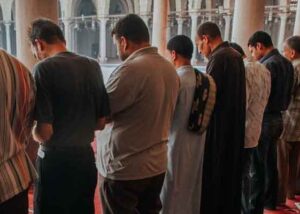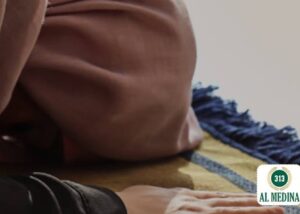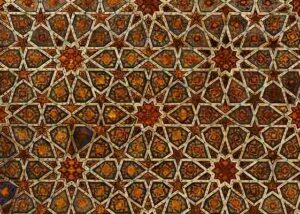Quran
Hadith
Islamic Text
بِسْمِ اللَّهِ الرَّحْمَنِ الرَّحِيمِ
In the Name of Allah Most Merciful Most Kind
Short Answer
No, Eid prayer is not Fard upon women. However, eid prayer is Wajib upon men according to the Hanafi Madhab.
Hadith about Eid prayer for women
عَنْ أُمِّ عَطِيَّةَ، قَالَتْ: كُنَّا نُؤْمَرُ بِالْخُرُوجِ فِي الْعِيدَيْنِ، وَالْمُخَبَّأَةُ، وَالْبِكْرُ
(Sayidah) Umm Atiyyah (May Allah Most High be pleased with her) said, ‘We used to be commanded to attend the Eid prayers. Even the recluse and the virgin.’ (Sahih Muslim, 809 -11).
Is Eid prayer Fard for women then?
The Hadith narration above seems to oblige (Fard) Eid prayer upon women. This is because the general rule regarding a command in Quran or Sunnah is that it denotes obligation (Fard or Wajib). Despite this, there are many exceptions to this general rule in Quran and Sunnah. Furthermore, the Hadith above is an example of such an exception too.
The command mentioned in the Hadith above is for permissibility not obligation. The scholars concluded this due to other related evidence. Women were generally encouraged to pray at home so the Hadith above is seen as permitting them to go to the Eid prayer and not obliging them.
وَأَمَّا صَلَاةُ الْعِيدِ فَإِنَّهَا تُؤَدَّى فِي الْجَبَّانَةِ فَيُمْكِنُهَا أَنْ تَعْتَزِلَ نَاحِيَةً عَنْ الرِّجَالِ كَيْ لَا تُصْدَمَ فَرَخَّصَ لَهُنَّ الْخُرُوجَ وَاَللَّهُ أَعْلَمُ ثُمَّ هَذَا الْخِلَافُ فِي الرُّخْصَةِ وَالْإِبَاحَةِ فَأَمَّا لَا خِلَافَ فِي أَنَّ الْأَفْضَلَ أَنْ لَا يَخْرُجْنَ فِي صَلَاةٍ لِمَا رُوِيَ عَنْ النَّبِيِّ – صَلَّى اللَّهُ عَلَيْهِ وَسَلَّمَ – أَنَّهُ قَالَ: «صَلَاةُ الْمَرْأَةِ فِي دَارِهَا أَفْضَلُ مِنْ صَلَاتِهَا فِي مَسْجِدِهَا، وَصَلَاتُهَا فِي بَيْتِهَا أَفْضَلُ مِنْ صَلَاتِهَا فِي دَارِهَا. (بدائع الصنائع في ترتيب الشرائع)
As for Eid prayer, it is prayed in the open prayer space. Therefore, it is possible for her to distance herself from the men. Such that she does not mix with them. So, it is permitted for them (women) to attend. Allah Most High knows best. This difference is regarding the dispensation and permissibility of them attending. There is no difference regarding the fact that it is best for them not to attend the prayer. This is due to what was narrated from the Prophet ﷺ: ‘The prayer of the woman in her house is better than her prayer in her Masjid, and her prayer in her room is better than her prayer in her house.’ (Imam Abu Bakr al-Kaasaani, Badai al-Sanai).
وَقَالَ الطَّحَاوِيّ: كَانَ الْأَمر بخروجهن أول الْإِسْلَام لتكثير الْمُسلمين فِي أعين الْعَدو. قلت: كَانَ ذَلِك لوُجُود الْأَمْن أَيْضا، وَالْيَوْم قلَّ الأمنُ، والمسلمون كثير. (عمدة القاري شرح صحيح البخاري)
(Imam) al-Tahaawi said, the command for them to attend was at the beginning of Islam. This was done so that the enemy perceive a greater number of Muslims attending. I say, it was also because it was safe to do so too. As for today, safety has diminished and there is an abundance of Muslims. (Imam Badr al-Deen al-Ayni, Umdatu al-Qari Sharh Sahih al-Bukhari).
In the Nass (text) above Imam al-Tahtawi provides a different explanation. He states that the Hadith of (Sayidah) Umm Atiyyah (above) is describing the situation prior to abrogation. Thereafter, abrogation took place and women were no longer commanded to attend the Eid prayers. This opinion is further supported by the following Hadith of Sayidah Ayeshah (May Allah Most High be pleased with her).
عَنْ عَمْرَةَ، عَنْ عَائِشَةَ رَضِيَ اللَّهُ عَنْهَا، قَالَتْ: لَوْ أَدْرَكَ رَسُولُ اللَّهِ صَلَّى اللهُ عَلَيْهِ وَسَلَّمَ مَا أَحْدَثَ النِّسَاءُ لَمَنَعَهُنَّ كَمَا مُنِعَتْ نِسَاءُ بَنِي إِسْرَائِيلَ
(Sayidah) Aishah (May Allah Most High be pleased with her) said, ‘If the Messenger of Allah ﷺ had seen what the women do now, he ﷺ would have forbidden them (from going to the Masaajid) as the women of Bani Israel had been forbidden.’ (Sahih al-Bukhari, 869).
وَأَمَّا الْعَجَائِزُ فَلَا خِلَافَ فِي أَنَّهُ يُرَخَّصُ لَهُنَّ الْخُرُوجُ فِي الْفَجْرِ وَالْمَغْرِبِ وَالْعِشَاءِ وَالْعِيدَيْنِ، وَاخْتَلَفُوا فِي الظُّهْرِ وَالْعَصْرِ وَالْجُمُعَةِ قَالَ أَبُو حَنِيفَةَ: لَا يُرَخَّصُ لَهُنَّ فِي ذَلِكَ وَقَالَ أَبُو يُوسُفَ وَمُحَمَّدٌ يُرَخَّصُ لَهُنَّ فِي ذَلِكَ. (عمدة القاري شرح صحيح البخاري)
As for elderly women, there is no difference regarding them having a dispensation to attend Fajr, Maghrib, Isha and the Eid prayers. However, they differed over Dhuhr, Asr and Jumu’ah (Friday prayer). (Imam) Abu Hanifah said, they do not have a dispensation for that. Whilst (Imams) Abu Yusuf and Muhammad said, they do have a dispensation for that. (Imam Badr al-Deen al-Ayni, Umdatu al-Qari Sharh Sahih al-Bukhari).
Who is Eid Fard upon?
As we have seen above, the Eid prayer is not obligatory (Fard) upon women. Rather, eid prayer is Fard upon resident men who are not prevented by their health. Further, this ruling is the same as the Friday prayer.
(تجب صلاة العيد على كل من تجب عليه الجمعة) حتى لا تجب على المسافر والمريض والأعمى والمرأة. (منحة السلوك في شرح تحفة الملوك)
Eid prayer is obligatory upon everyone that Jumu’ah (Friday) prayer is obligatory upon. Hence, it is not obligatory upon a traveller, a sick person, a blind person, or a woman. (Imam Badr al-Deen al-Ayni, Minhatu al-Suluk fi Sharh Tuhfatu al-Mulook).
وَلَا تَجِبُ الْجُمُعَةُ عَلَى مُسَافِرٍ وَلَا امْرَأَةٍ وَلَا مَرِيضٍ. (الهداية في شرح بداية المبتدي)
Jumu’ah (Friday prayer) is not obligatory upon a traveller, a woman, or an ill person. (Imam al-Marghinani, al-Hidaayah).
فَلَا تَجِبُ عَلَى مُسَافِرٍ، وَلَا عَلَى امْرَأَةٍ، وَلَا مَرِيضٍ. (البحر الرائق شرح كنز الدقائق)
It (Friday prayer) is not obligatory upon a traveller, a woman, or an ill person. (Imam al-Ibn Nujaym, al-Bahr al-Raiq).
Another misconception that is rife in our communities is that of women praying Eid prayer at home. This Eid prayer is invalid. Neither men nor women can pray Eid prayer or Jummah prayer at home. Further, both of these prayers must be established in a public place otherwise they are invalid. So, if women want to pray Eid Salah, then they will have to attend the public congregation. Praying Eid prayer at home will be null and void.
And Allah Most High Knows Best.
–Answered Shaykh Noorud-deen Rashid (18.04.23)






